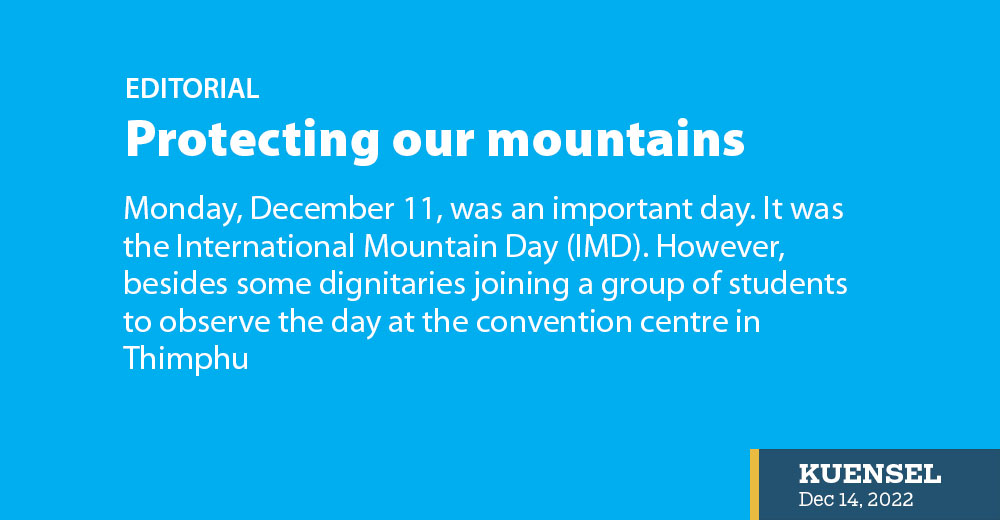Monday, December 11, was an important day. It was the International Mountain Day (IMD). However, besides some dignitaries joining a group of students to observe the day at the convention centre in Thimphu, the day passed by as silently as the mountain issues that are untold, under-reported or hijacked by other important issues like the economy, reform or moving to Australia.
Bhutan is a mountainous country – so we grew up learning our basic geography. The geography has not changed. The issues have. And it will have a huge bearing on us. Our elders say we will live as long as the mountains do. The mountains are changing, threatened by human activities thus threatening our very existence.
We might take pride in being carbon negative or in our conservation efforts, but when it comes to global warming or climate change, our efforts are not enough to save our mountains. Climate change sees no boundaries. What happens in the foothills of the Himalayas, the Amazon Forest in South America or in the deserts of the Middle East impacts what happens in Lunana.
Climate change is a global issue. It is fortunately recognized as one. A firsthand account of those bearing the brunt could make an impact. This year, in observing the IMD, leaders of United Nations in five South Asian countries joined forces to strengthen regional cooperation on climate change, disaster response, emergency preparedness, and economic and social development.
The stories or real-life experiences shared by people in the five countries may differ, but they are branches of the same root. Whether it is melting glaciers in Nepal, Pakistan or Bhutan, the cause is global warming. We have recently seen how mountainous countries have been affected by climate-induced disasters. It is Pakistan this year, it could be Nepal, us or India next. High up in the Himalayas, the mountains will not differentiate who is causing the ice to melt or mountainsides to slide.
This year, those that can influence, came together to work on a series of joint activities to address common problems related to global warming. It includes biodiversity loss, increased glacial melting, and less predictable water availability that could impact livelihoods and well-being in the Himalayan foothills.
Those living in the mountains are the most vulnerable even when they are the so-called protectors. In Bhutan and Nepal, highland communities revere the mountains. For centuries they coexisted without any problem. Their strong belief in nature helped them preserve and protect. This is changing as the mountains are now seen as a source of new wealth.
Women in Laya, as one told Kuensel, are happy to see that water pipes are not blocked with ice in winter. It could be the calm before the storm. Perhaps, they are not aware of the bigger impacts.
On Monday, a little girl from Soe Primary School, in a video message, summed up the importance of mountains. In asking world leaders to save Mountain Jomolhari where her small village stands at the base, she was asking world leaders to save the world, not only the mountains.


